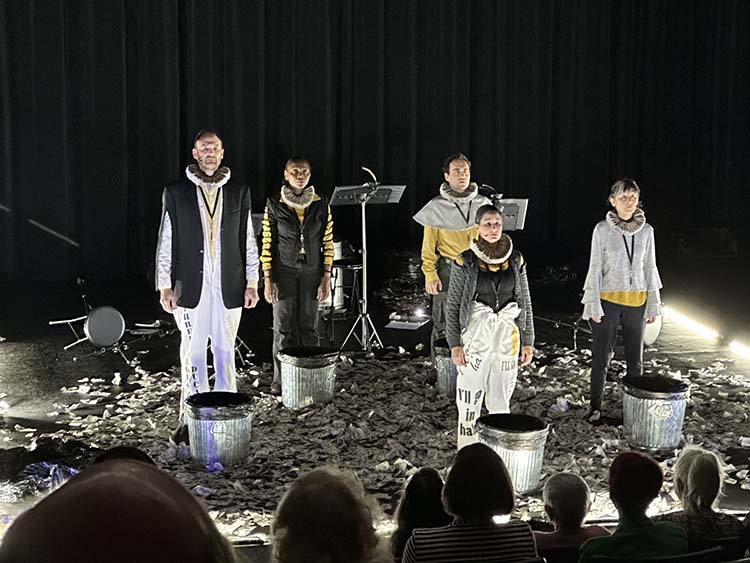
By Sandi Masori

LA JOLLA, California — Right now performances with Jewish themes are being staged in theatres all over San Diego. It’s the annual JFest, a 30-year tradition. This year features 15 events at 8 venues. I’ll be attending a few of them, so now that you know where these shows come from, let’s get into the first one, written by Aaron Henne, that I watched at the JCC over the weekend. It is listed in the program as theatre dybbuk: The Merchant of Venice (Annotated), or In Sooth I Know Not Why I Am So Sad.
Let me start by saying that I thought the cast was great. The five actors (Joe Jordan, Adam Lebowitz-Lockard, Julie A. Lockhart, Diana Tanaka, and Inger Tudor) were equally strong and worked well together as a company. You could tell that they were very committed to their parts.
I want to precede this review by saying that I think avantgarde theatre that is designed to make you think is an important creative expression and we need art that starts conversations. Now having said that, I have to admit that it left me scratching my head wondering if I were smart enough to be in the audience.
The show opens with the five actors wearing janitor costumes and pushing money around on the stage as they clean up. This is happening as the audience comes into the theatre. From the sound system you hear clips of various political speeches, mostly Republican, and some of the crazier soundbytes that have come from the right wing of that party. The cast then begins to summarize Shakespeare’s The Merchant of Venice. As actors speak their lines, others spread more fake money around the stage and knock down some of the props. The narration of key parts of Merchant are juxtaposed with recitations of contemporary news and quotes. The actors also provide some historical context to what was happening in England in the 1500s when Shakespeare was writing the play.
To be honest, I found a lot of it confusing and unclear. It was not without interesting tidbits however. At one point they described how the character of “Jessica the Jew” had changed to suit political needs of the time. The daughter of Shylock the Jew, Jessica converts to marry a Christian. Shylock the Jew was a character that Nazis loved to hate, so gross is the caricature of a moneylender who wants “a pound of flesh” in payment for a loan. When the Nazis put on the show, they changed Jessica into a foster child who was not a Jew so that her subsequent marriage to a Christian didn’t violate their ban on Jews marrying Christians. More recently, other performances have sought to play up Jessica’s Jewishness by having her and Shylock singing together in Hebrew “A Woman of Valor,” taken from Proverbs 31:10-31.
I guess the overall theme and takeaway was that we haven’t come far at all in the past 500 years when it comes to hate. Marginalized people are still oppressed, antisemitism is still rampant, and hate is finding a whole new audience through modern technology.
Even though I left in a state of confusion, the play was well done and worth watching. It sparked conversation on the way home, so the mission of the Los Angeles-based theatre dybbuk company in cooperation with the JFest was accomplished. More importantly, I think it’s important for us to support the festival and the shows in it because if we the Jewish community don’t, who will?
*
Sandi Masori is a food and theatre reviewer for San Diego Jewish World. When she’s not covering food or theatre, she helps authors self-publish, hangs out with her kids, and searches for the best sushi in town.